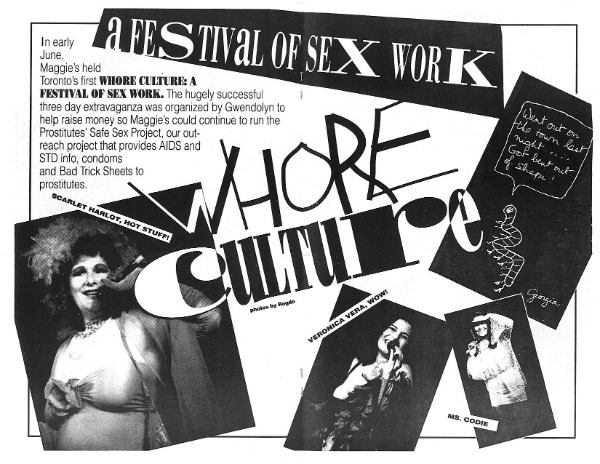 December 17 is the International Day to End Violence Against Sex Workers. The history of sex work is the history of resilience and labour, of trauma and violence, of solidarity and stigma, of resistance, activism, and advocacy. A central slogan of the Sex Worker Right’s Movement is nihil de nobis, sine nobis: “nothing about us, without us.” The ArQuives has a number of holdings created by sex workers from LGBTQ+ communities. Below is a list of some examples of the archival material accessible to researchers of all kinds.
December 17 is the International Day to End Violence Against Sex Workers. The history of sex work is the history of resilience and labour, of trauma and violence, of solidarity and stigma, of resistance, activism, and advocacy. A central slogan of the Sex Worker Right’s Movement is nihil de nobis, sine nobis: “nothing about us, without us.” The ArQuives has a number of holdings created by sex workers from LGBTQ+ communities. Below is a list of some examples of the archival material accessible to researchers of all kinds.
The Personal Records of Danny [Daniel Charles] Cockerline
![The Personal Records of Danny [Daniel Charles] Cockerline](https://arquives.ca/wp-content/uploads/2020/07/sexworkers1-300x216-1.jpg) Accession Number: 1999-021 Danny Cockerline was a well-known Torontonian sex worker and activist in the late 1980s and early 1990s. He was a founding member of the Canadian Organization for the Rights of Prostitutes, Maggie’s, the Sex Workers’ Alliance of Toronto, and the Prostitutes’ Safe Sex Project. After years of activism and outreach in the sex work community, Cockerline died by suicide in December 1995 after he was diagnosed with HIV. His personal papers were donated to the Archives in 1999, and they provide intimate insight into the sex work activism community in Toronto during the HIV/AIDS crisis. The collection contains a wide array of personal materials including travelogues, poems, and personal notes, and has copies of his prolific correspondence: during his active years he campaigned to rebrand sex workers as “safe sex experts,” and insisted that AIDS groups rewrite their materials to say “high-risk activities” instead of “high-risk groups.” His papers also contain many materials related to the early history of Maggie’s, including pamphlets and documents designed for community outreach.
Accession Number: 1999-021 Danny Cockerline was a well-known Torontonian sex worker and activist in the late 1980s and early 1990s. He was a founding member of the Canadian Organization for the Rights of Prostitutes, Maggie’s, the Sex Workers’ Alliance of Toronto, and the Prostitutes’ Safe Sex Project. After years of activism and outreach in the sex work community, Cockerline died by suicide in December 1995 after he was diagnosed with HIV. His personal papers were donated to the Archives in 1999, and they provide intimate insight into the sex work activism community in Toronto during the HIV/AIDS crisis. The collection contains a wide array of personal materials including travelogues, poems, and personal notes, and has copies of his prolific correspondence: during his active years he campaigned to rebrand sex workers as “safe sex experts,” and insisted that AIDS groups rewrite their materials to say “high-risk activities” instead of “high-risk groups.” His papers also contain many materials related to the early history of Maggie’s, including pamphlets and documents designed for community outreach.
The James Fraser Library Collection
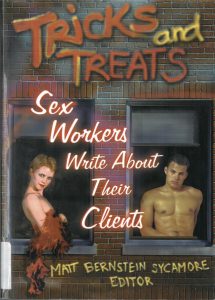 In addition to its archival holdings, The ArQuives also has a reference library. The library has a collection of memoirs and personal narratives written by sex workers, and some edited volumes of shorter writings by sex workers. Some of these titles from the latter category warrant robust critiques in their framing and presentation of the material, but are nonetheless important to the historical record. If anyone has materials or texts that they wish to donate to make the library more inclusive, The ArQuives would greatly appreciate them. The library collections contains four memoirs about hustling and male sex work: Suburban Hustler: Stories of a Hi-Tech Callboy by Aaron Lawrence, The Happy Hustler: My Own Story by Grant Tracy Saxton, My Undoing: Love in the Thick of Sex, Drugs, Pornography, and Prostitution by Aiden Shaw, and Assuming the Position: A Memoir of Hustling by Rick Whitaker. It also contains three edited volumes of writing by sex workers and largely unedited interviews with sex workers: Tricks and Treats: Sex Workers Write About Their Clients, edited by sex worker and activist Mattilda Bernstein Sycamore, Sex Work: Writings by Women in the Sex Industry, edited by Priscilla Alexander and Frédérique Delacoste, and Whore Carnival, by Shannon Bell. The library also has a scholarly book about the lives and experiences of five black trans women, Honey, Honey, Miss Thang: Being Black, Gay, and on the Streets by Leon E. Pettiway, published in 1996. While this book is troubling in its framing—Pettiway’s introduction reads like a dusty relic ensconcing 1990s academic attitudes toward sex work and trans women in paper—it also strives to present the experiences of Shontae, China, Keisha, Detra, and Monique as told in their own voices. Given that people of colour who do sex work, especially trans sex workers, often exist in the margins of the margins, this book is highly important to the historical record despite its various glaring shortcomings.
In addition to its archival holdings, The ArQuives also has a reference library. The library has a collection of memoirs and personal narratives written by sex workers, and some edited volumes of shorter writings by sex workers. Some of these titles from the latter category warrant robust critiques in their framing and presentation of the material, but are nonetheless important to the historical record. If anyone has materials or texts that they wish to donate to make the library more inclusive, The ArQuives would greatly appreciate them. The library collections contains four memoirs about hustling and male sex work: Suburban Hustler: Stories of a Hi-Tech Callboy by Aaron Lawrence, The Happy Hustler: My Own Story by Grant Tracy Saxton, My Undoing: Love in the Thick of Sex, Drugs, Pornography, and Prostitution by Aiden Shaw, and Assuming the Position: A Memoir of Hustling by Rick Whitaker. It also contains three edited volumes of writing by sex workers and largely unedited interviews with sex workers: Tricks and Treats: Sex Workers Write About Their Clients, edited by sex worker and activist Mattilda Bernstein Sycamore, Sex Work: Writings by Women in the Sex Industry, edited by Priscilla Alexander and Frédérique Delacoste, and Whore Carnival, by Shannon Bell. The library also has a scholarly book about the lives and experiences of five black trans women, Honey, Honey, Miss Thang: Being Black, Gay, and on the Streets by Leon E. Pettiway, published in 1996. While this book is troubling in its framing—Pettiway’s introduction reads like a dusty relic ensconcing 1990s academic attitudes toward sex work and trans women in paper—it also strives to present the experiences of Shontae, China, Keisha, Detra, and Monique as told in their own voices. Given that people of colour who do sex work, especially trans sex workers, often exist in the margins of the margins, this book is highly important to the historical record despite its various glaring shortcomings.
Mirha-Soleil Ross Collection
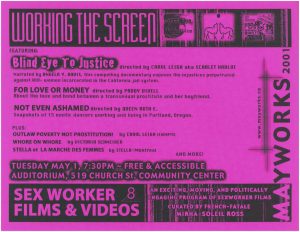 Accession Number: 2008-073 Mirha-Soleil Ross is a transsexual performance artist, video-maker, sex-worker, and activist (among other things). Ross is a researcher and archivist’s dream: her personal collection spans nearly two decades of activism and art. It includes a variety of audiovisual materials, including a 74-minute recording of her one-woman show, Yapping Out Loud: Contagious Thoughts from an Unrepentant Whore, performed at Buddies in Bad Times Theatre, and Madame Lauraine’s Transsexual Touch, a film about safer sex between trans sex workers and their clients. Her collection also includes materials pertaining to her sex work and trans activism, including documents around the Counting Past 2 festival and the Sex Worker Film Festivals from the 1990s and early 2000s, as well as her work as the founding coordinator of the Meal Trans drop-in program at the 519 Church Street Community Centre.
Accession Number: 2008-073 Mirha-Soleil Ross is a transsexual performance artist, video-maker, sex-worker, and activist (among other things). Ross is a researcher and archivist’s dream: her personal collection spans nearly two decades of activism and art. It includes a variety of audiovisual materials, including a 74-minute recording of her one-woman show, Yapping Out Loud: Contagious Thoughts from an Unrepentant Whore, performed at Buddies in Bad Times Theatre, and Madame Lauraine’s Transsexual Touch, a film about safer sex between trans sex workers and their clients. Her collection also includes materials pertaining to her sex work and trans activism, including documents around the Counting Past 2 festival and the Sex Worker Film Festivals from the 1990s and early 2000s, as well as her work as the founding coordinator of the Meal Trans drop-in program at the 519 Church Street Community Centre.
Zines
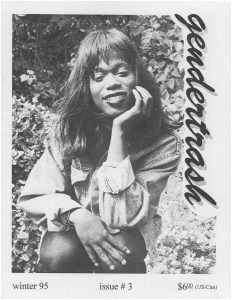 Accession Numbers: (gendertrash) 2006-167, 2008-073; (Maggie’s Zine is part of the LGBTQ+ periodicals collection) Xanthra Phillippa Mackay and Mirha-Soleil Ross, partners at the time, published the first of five issues of gendertrash in the Spring of 1993. The zine was dedicated to giving a “voice to gender described people, who have been discouraged from speaking out and communicating with each other.” While the publication was not specifically about sex work, it has significant content related to sex work in the trans community. The issues contain collections of poetry, prose, photographs, health and safety resources, memorials, and community warnings. The publication also actively targeted anti-sex work attitudes within the trans community. We currently have four out of five issues in the archives. Maggie’s newsletter/zine was “created by sex workers for sex workers.” Maggie’s mandate was, and is, to help sex workers work more safely. The zine and newsletters provided health and safety information to the sex work community with articles and advice columns, and were one way in which Maggie’s conducted community outreach and promoted safe sex practices, emphasizing that sex workers should use protection not just with their clients but also in their personal sexual relationships. We currently have three issues in the archives providing valuable insight into the history of Maggie’s: two newsletters from the 1992 and one zine, edited by Danny Cockerline, from the Winter of 1993-1994. **For more information about Zines in the archives, check out this earlier What’s in the Archives post.
Accession Numbers: (gendertrash) 2006-167, 2008-073; (Maggie’s Zine is part of the LGBTQ+ periodicals collection) Xanthra Phillippa Mackay and Mirha-Soleil Ross, partners at the time, published the first of five issues of gendertrash in the Spring of 1993. The zine was dedicated to giving a “voice to gender described people, who have been discouraged from speaking out and communicating with each other.” While the publication was not specifically about sex work, it has significant content related to sex work in the trans community. The issues contain collections of poetry, prose, photographs, health and safety resources, memorials, and community warnings. The publication also actively targeted anti-sex work attitudes within the trans community. We currently have four out of five issues in the archives. Maggie’s newsletter/zine was “created by sex workers for sex workers.” Maggie’s mandate was, and is, to help sex workers work more safely. The zine and newsletters provided health and safety information to the sex work community with articles and advice columns, and were one way in which Maggie’s conducted community outreach and promoted safe sex practices, emphasizing that sex workers should use protection not just with their clients but also in their personal sexual relationships. We currently have three issues in the archives providing valuable insight into the history of Maggie’s: two newsletters from the 1992 and one zine, edited by Danny Cockerline, from the Winter of 1993-1994. **For more information about Zines in the archives, check out this earlier What’s in the Archives post. 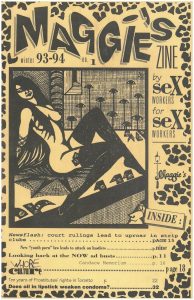 The Archives has profound limitations. Currently, the majority of the holdings on sex work contain the history of white sex workers. It is important to address this archival gap: The ArQuives is attempting to move toward broader inclusivity, and needs donations of materials that more fully represent sex work and queer histories. It is also important to note that many of the historical documents and artifacts contain language that is now considered problematic. Despite this, these materials are still important to the historical record. Finally, it is important to consider how privilege operates in the creation and presentation of archival materials. As you research, we invite you to contemplate how different histories are presented, and rigorously question gaps in the historical record. Author: Sydney Gautreau, volunteer Although the James Fraser Library and the Mirha-Soleil Ross collections are held onsite at 34 Isabella Avenue in Toronto, please be aware that the Cockerline collection and the Zines are held offsite and an appointment is required to retrieve them. To make an appointment, please email queeries@arquives.ca
The Archives has profound limitations. Currently, the majority of the holdings on sex work contain the history of white sex workers. It is important to address this archival gap: The ArQuives is attempting to move toward broader inclusivity, and needs donations of materials that more fully represent sex work and queer histories. It is also important to note that many of the historical documents and artifacts contain language that is now considered problematic. Despite this, these materials are still important to the historical record. Finally, it is important to consider how privilege operates in the creation and presentation of archival materials. As you research, we invite you to contemplate how different histories are presented, and rigorously question gaps in the historical record. Author: Sydney Gautreau, volunteer Although the James Fraser Library and the Mirha-Soleil Ross collections are held onsite at 34 Isabella Avenue in Toronto, please be aware that the Cockerline collection and the Zines are held offsite and an appointment is required to retrieve them. To make an appointment, please email queeries@arquives.ca
